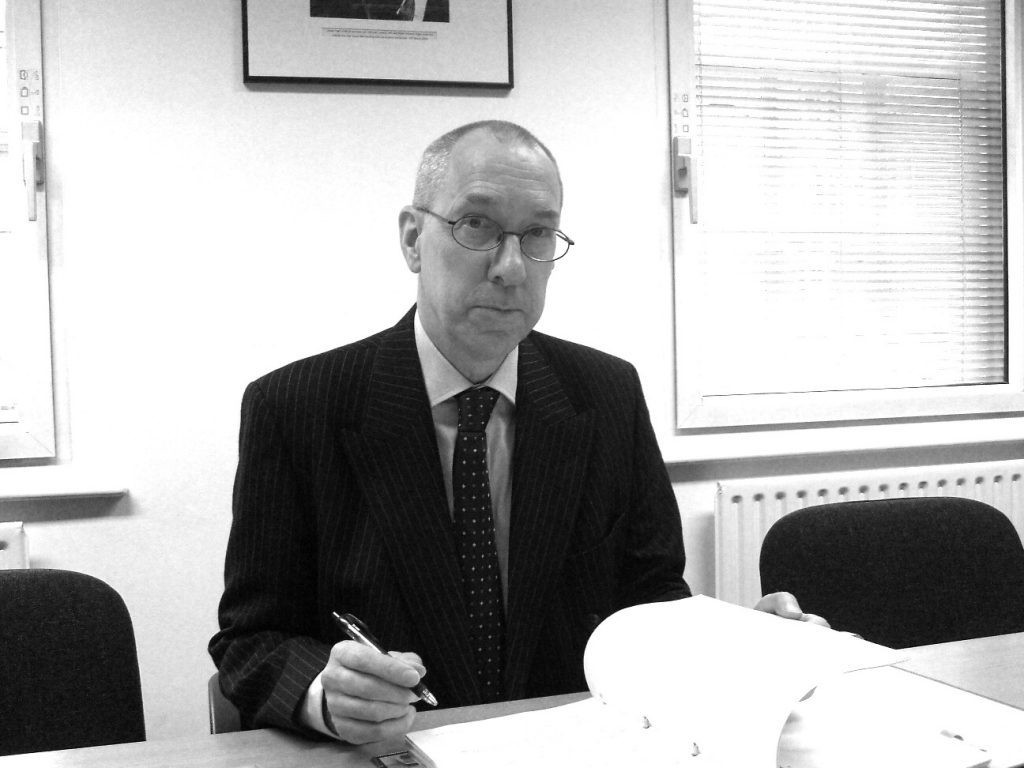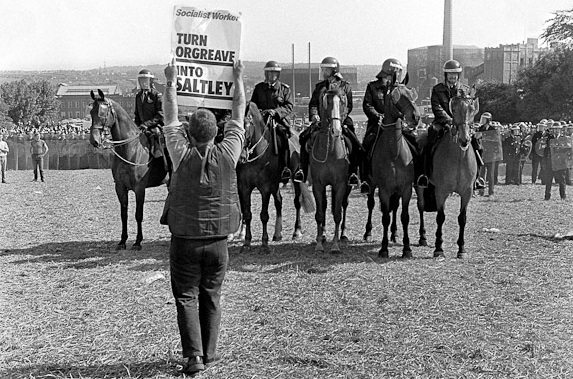[contextly_auto_sidebar id=”cRnU4WSq92RLPbIKAbITtTuHK8GaDPlE”]
Two and half years after the South Yorkshire Police referred themselves to the Independent Police Complaints Commission (IPCC) over their alleged conduct in relation to events at Orgreave in 1984 during the miners’ strike the IPCC announced that it was not going to bother with a formal investigation. According to the watchdog’s deputy chair Sarah Green ‘these are events from more than 30 years ago and I have considered the impact such a passage of time could have on an IPCC investigation and possible outcomes’.
In other words, it was all a long time ago, too much trouble to investigate and not really worth bothering with anyway.
The announcement probably didn’t take too many people by surprise but was nonetheless greeted with a degree of anger and dismay particularly amongst former miners, their families and supporters. It also led to a chorus of demands that there should finally be a full judicial inquiry into the events that occurred in the summer of 1984 at the Orgreave plant culminating as they did in the events on 18th June that year.
18th June 1984 was the 100th day of the miners’ strike and large numbers of pickets attended the Orgreave coking plant on the outskirts of Sheffield in an attempt to close the plant. The police were ready for them. Over the course of that day miners were systematically attacked by police who used mounted officers and snatch squads to make arrests. Many of these were random arrests. Whoever couldn’t run fastest when the police charged got arrested.
Fabricated evidence
Officers were assigned to deal with a prisoner even though they had not actually been involved in the arrest. Arrests were mainly for offences such as threatening behaviour, assault police and unlawful assembly. No one was arrested on the day for riot. It was however the intention of the senior officer Chief Constable Peter Wright that the miners should be made an example of. At his behest 71 miners were charged with riot, at the time a common law offence for which the maximum penalty was life imprisonment and a further 24 with violent disorder.
The miners were to be tried in batches. The trial of 15 miners in 1985 charged with riot collapsed even before the prosecution had finished its case. By then it was obvious to all hearing the evidence that the police had fabricated evidence, some officers had not even arrested the prisoner they claimed to and the whole trial had descended to such levels of farce that the prosecution lawyers threw in the towel.
All charges against the remaining miners were dropped. Apart from a pay out of a few thousand pounds to each of the miners wrongfully accused that seemed to be the end of the matter. There was no proper investigation of what had happened, certainly no one in authority ever questioned how it had all come about, who had authorised the stitch-up and who else was involved. No SYP police officer was ever called to account for their actions much less prosecuted.
Back in 2012 I was asked to read through the statements of the officers in the trial. I read statements from over 40 officers from seven different police forces from as far afield as Northumbria and Hertfordshire. The extent of the collusion was immediately apparent. This was not a case of two officers involved in the same incident helping each other to remember accurately what had happened. This was wholesale collusion. Large parts of the officers’ statements were in almost identical language. For example 13 officers from 4 forces who made 8 separate arrests used the phrase “Periodically there was missile throwing from the back of the pickets”. A further 27 officers from four forces involved in 15 arrests used this phrase but then added “but apart from this there was no trouble.”
How can 40 officers in these circumstances all begin a sentence using the word “periodically” as opposed to some saying “from time to time” or “occasionally” or “at times” without being told in some way or other that that is what they should write? And whose idea was it to add that final phrase?
No less than 26 officers from four forces involved in 14 separate arrests quoted the following passage with minor variations: “At about 07.55am that morning empty coke wagons/lorries drove into the Plant and the pickets began shouting “Here we go, here we go” and charged the police ranks/lines. There were both police officers and pickets knocked to the ground.” Eventually the pickets were repelled and they retreated. There was however a continual barrage of missiles.” How can so many officers use the phrase “repelled and retreated” as opposed to “pushed back” or “forced back” etc unless they were told to use those words?
The statements continue to use similar language throughout. Examples being “At about 8.15am shields were brought/taken to the front ranks to protect other officers from stones/missiles being thrown”, followed by “At about 0835 ACC Clements/a senior officer went to the front of the police lines and told the pickets to retreat 100 yards or he would deploy horses and officers carrying short shields and staffs.” And then “The pickets failed to retreat and he repeated his announcement. There continued to be a hail of missiles.” Followed by “Then the front ranks opened and the police horses trotted through the lines towards the pickets”.
What the police achieved by this device was control of the media. This was the story spread by the SYP in order to suggest the pickets had been responsible for significant violence that required a police response when the truth, as testified to by numerous pickets present that day, was that the police attacked them. It is said that the best form of defence is attack and this was the SYP seeking to put out a false narrative designed to justify their use of extreme violence towards the picketing miners and the bringing of such serious charges as riot. This is also the occasion of the infamous photograph of a female photographer cowering from a mounted officer about to hit her full force with his long staff. Like all the others that officer was never disciplined for the violence meted out that day.
Anyone who experienced life in one of the numerous pit villages during the year long strike could be forgiven for thinking that at that time at least they really were living in a police state. Villages were flooded with police officers. The miners often couldn’t even leave their homes without being challenged by a police officer. As a young barrister I drove from Ollerton in Nottinghamshire to Worksop to the magistrates’ court for a remand hearing. I was given a lift by my client and a couple of his mates, all striking miners. On our return to the village after court we were required to stop at a police roadblock on the approach to the village and justify our presence there. That was the reality of life under police occupation.
But happily we don’t live in a police state. For all its faults we do live in a sort of democracy and we do live under the rule of law. That applies as much to the police as anyone else and no police officer of whatever rank is above the law. That is why what happened at Orgreave back in 1984 is still a matter of real significance. No one was ever held to account for the lies told about the miners at Orgreave and the false account that was put out by the police. When 70 men face trial for riot but then the first trial collapses and the others never even take place someone in authority should have demanded answers.
Some people still talk in terms of “the miners’ riot” at Orgreave. Maybe some police officers still believe that is what it was. But there are thousands of others who were also there that day who know that the only people rioting on 18th June 1984 were not bare-chested sunbathing miners but police officers from all over the country tooled up with long and short shields and staffs with which to beat and cause injury. Why that was never thought worthy of a full inquiry back in 1984 remains a mystery. It obviously should have been if only to dispel the myths about who is was who had rioted that day.
But quite apart from the physical behaviour of the police that day, there is no doubt in my mind that what happened at Orgreave concerning witness statements amounts to an attempt to pervert the course of justice. Moreover it can only have occurred as a result of orders right from the top, organised by the most senior officers in the SYP at the time. We seem to be in an era when people are finally made accountable for crimes they committed many years before.
It is high time that the police are held to account for the injustice committed against the miners at Orgreave. In response to the publication of the IPCC report, Yvette Cooper MP joined others in calling for a public inquiry. I agree. The passage of 30 years has done nothing to heal the wounds caused at Orgreave. A deep sense of injustice burns within the hearts of many of those who felt the full and illegal force of the law that day. They demand justice and justice they should finally get.









